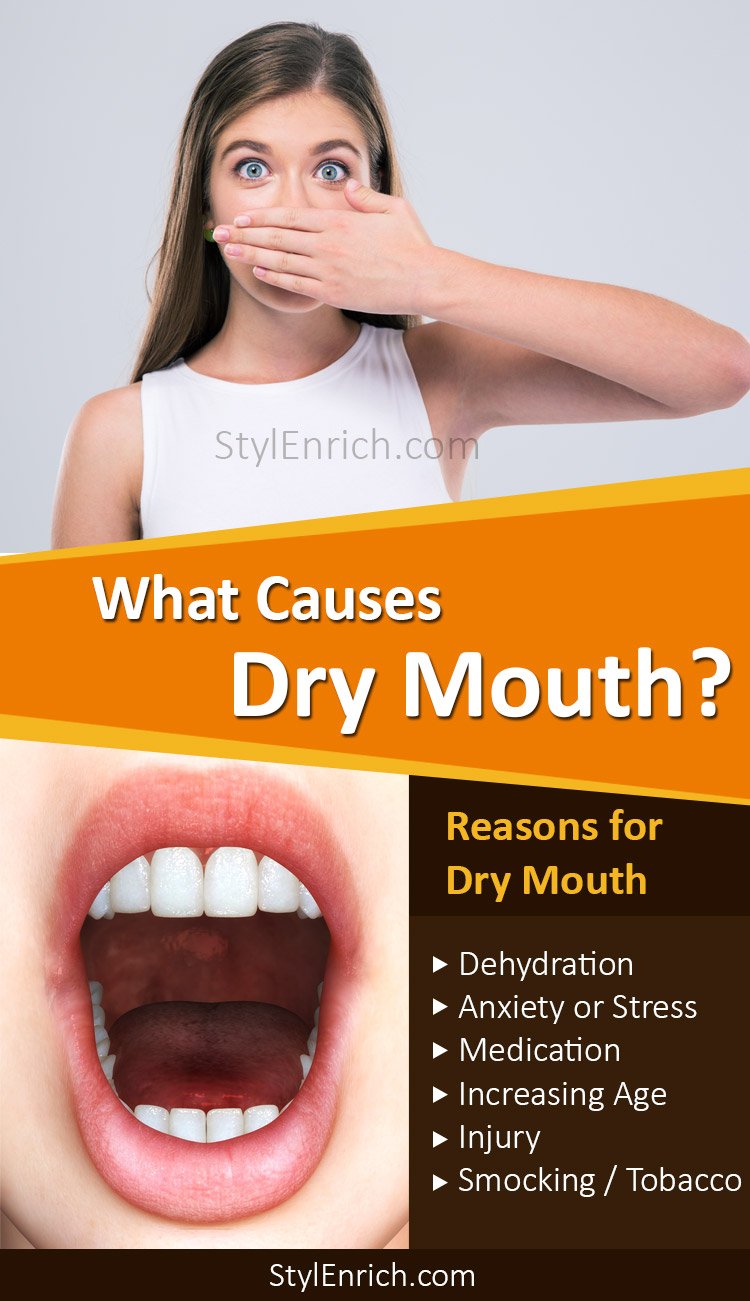Saliva plays an important part in digestion and mouth hygiene. The saliva cleanses, moistens, and protects the mouth. Moreover, it prevents tooth decay by controlling the bacteria and fungi levels in the mouth.
When the saliva secretion in the mouth lessens to a significant amount, it results in a physical condition of Dry Mouth. Dry Mouth causes difficulty in chewing, swallowing, and speaking; moreover, it affects the digestion of food which may lead to malnutrition in extreme cases.
What is Dry Mouth?
Dry Mouth is an uncomfortable state of the body caused by insufficient saliva or spit in the mouth. Dry mouth is not a disease but a disorder that can be temporarily brought on by medications, illness, a physical state of exhaustion, or a person’s state of mind or stress.
When the dry mouth condition is severe, is a side-effect of a disease, or is related to a regular medication it is also called as Xerostomia.
It is stated that any given time, approximately 19% of the people in the world suffer from Dry Mouth disorder. Dry Mouth is more prevalent in women in comparison to men. Elderly people are prone to Dry Mouth due to illness, age, malfunctioning of salivary glands and medications.
What are the symptoms of Dry Mouth?
Dry mouth is easy to recognize. The uncomfortable sensation in the mouth may be as identified with the following symptoms :
- Dryness in the mouth
- Difficulty in swallowing
- Difficulty in eating
- Burning sensation in the throat
- Increased thirst
- Cracked lips
- Constant hoarse/ sore in the throat
- Bad breath
- Taste Disorder
- White tongue
- Thick Tongue
- Mouth ulcers
- Dry nasal passage
What are the Causes of Dry Mouth?
The condition of Dry Mouth can be caused by numerous reasons, let’s look at the common causes of Dry Mouth :
1. Medication
Certain medications are known to cause decreased saliva production in the mouth. Currently, there are over 400 types of medicines that have been reported to result in conditions like Dry Mouth. The following medicines are the most commonly known causes of Dry Mouth –
- steroids
- anti-histamine
- anti-inflammatory
- anti-depressants
- high blood pressure medication
2. Age
Increased age usually results in an increase in the number of diseases and their medications; thus, Dry Mouth is a common disorder among the elderly population. An inability of the body to secrete sufficient saliva or process medication may also be a cause for Dry Mouth in senior citizens. However, it must be noted that age is not a definitive cause of Dry Mouth.
3. Cancer Treatment
The treatment of cancer includes chemotherapy and radiation therapy. These treatments are known to damage the salivary glands in the body, thereby, causing the condition of Dry Mouth. Usually, this condition is temporary and lasts a maximum of 8 weeks after the therapy. Effective symptomatic management is recommended for this condition.
4. Dehydration
Excessive exercise or playing without proper body hydration level management may result in the condition of dehydration, i.e. the level of fluids in the body reduces drastically. Often this condition is manifested by presenting a state of Dry Mouth.
If the condition is severe, an urgent re-hydration is required for this condition by consuming water and necessary salts required by the body. However, mostly this condition can be dealt with at a less urgent pace.
5. Smoking or Tobacco
Poor saliva production in the mouth is often caused by smoking. Tobacco slows down the saliva production process. Although smoking or tobacco is not directly responsible for the disorder, it promotes or aggravates the Dry Moth condition by hampering the salivary glands’ efficiency.
6. Injury
A rare case of head or neck injury can result in Dry Mouth. The condition occurs due to nerve damage caused during the injury that prevents the appropriate production of saliva in the mouth. In such cases, advice from a health care professional is important to improve the saliva secretion in the mouth.
7. Stress, Anxiety or Nervousness
The feeling of stress or nervousness and the condition of anxiety often result in poor performance of the salivary glands. This may cause a condition of Dry Mouth. Long-term condition of stress or anxiety may result in Dry Mouth disorder.
The physiological symptoms of nervousness or anxiety or stress, like over-sweating or dryness in the mouth, and the medical prescription of antidepressant for the underlying psychological disorder can effectively cause Dry Mouth.
8. Autoimmune Diseases
The most disturbing autoimmune diseases that cause of Dry Mouth are –
- Sjogren’s disease is an Autoimmune Disease resulting in the disorder of the immune system. It is identified by the two most common symptoms of dry eyes and mouth.
- HIV/ AIDS can cause certain salivary gland disease. In these diseases, the salivary glands swell up and are unable to function
properly resulting in Dry Mouth condition.
9. Excessive exposure to Heat / Sun
When a person spends excessive long-term periods in the sun, the body tends to loose required fluids through excessive perspiration. This may result in sun/ heat stroke in its extreme form. These exposures are likely to make the skin, mouth, and lips dry.
It is researched the light-skinned people are more prone to excessive exposure to the sun; therefore, they may suffer from dry mouth more often than dark-skinned people.
10. Diabetes
A common side-effect of Diabetes is having Dry Mouth Disorder. The high glucose levels in the blood cause Dry Mouth in an individual. Often doctors consider dry mouth a symptom of diabetes.
11. Sleeping with an Open Mouth
Some people suffer from deviated nasal passages, sinus problems, or chronic stuffy nose. These people often find themselves unable to breathe during horizontal positions. Most patients of such problems complain of dry mouth as they tend to breathe through their open mouth due to obstructed nasal pathways.
Can Dry Mouth be treated with Home Remedies?
Unfortunately, there are no known remedies for dry mouth conditions. However, there are remedial actions that can be taken to avoid serious discomfort, further deterioration of mouth and dental hygiene, as well as improve the condition of the mouth.
1. Drinking Fluids
This action will result in counteracting many symptoms and causes of Dry Mouth, like :
- Dehydration
- Exposure to excessive sun/ heat
- Dryness in the mouth
- Difficulty in speaking, swallowing, and chewing
It is recommended that 3-4 liters of water or fluid consumption is required to maintain general good health.
2. Sugar-free Toffee
The salivary glands are signaled to produce saliva for digestion. When a person sucks on a sugar-free toffee, the brain sends the glands a signal to produce more saliva to aid in digesting the toffee. Therefore, the mouth’s salivary balance is maintained.
It is recommended to use sugar-free toffees for this action, as they don’t cause cavity and decay of teeth as well as contribute to general good dental health.
3. Chewing Gum
Similar to the toffees, chewing a piece of gum (preferably sugar-free) sends the brain a signal to initiate the digestive process. The chewing process is aided by saliva production, thus, the salivary glands are sent a brain signal to increase saliva production. This effectively increases the saliva in the mouth reliving an individual from the Dry Mouth symptoms.
4. Clove or Cardamom
The sucking on a clove or cardamom has the same effect as that of sucking on a toffee, it increases saliva secretion in the mouth and provides relief. Moreover, cloves are good for gum and teeth health. Sucking on a clove releases clove oil directly into the mouth to prevent tooth decay. Clove or Cardamom also relieve soreness of throat, difficulty in swallowing, etc. by release essential oils into the system.
Few Frequently Asked Questions about Dry Mouth Condition
1. What precautions to follow when suffering from Dry Mouth?
Ans : The symptoms of Dry mouth can sometimes cause severe discomfort, the following precautions help in providing symptomatic temporary relief –
- Stop Smoking
- Avoid Alcohol
- Do not consume caffeinated drinks
- Avoid high sugary food
- Avoid consumption of spicy food
These actions will effectively decrease the distress caused in difficulty of swallowing, dehydration, sore throat, etc.
2. Is the Dry Mouth condition permanent?
Ans : Usually, this condition is a temporary manifestation of numerous cause. However, if an individual suffers from long-term diseases like autoimmune disease, diabetes, high blood pressure, etc. then the condition may be a result of the medicines consumed or a symptom of the disease itself. In such cases, the condition may be permanent and it is advised that the person seeks medical help.
3. Which medications need should be avoided to prevent Dry Mouth?
Ans : Medicines for diseases are required to be consumed at the advice of a doctor to maintain good health; however, certain medications can be avoided to prevent dry mouth disorder. They are as following –
- Appetite Suppressants
- Muscle Relaxants
- Diuretics
Moreover, if you consume diabetes, high blood pressure, steroids, etc. medications that are causing dry mouth, you can practice the following lifestyle changes to relieve your symptoms –
- Brush twice daily
- Avoid coffee
- Drink 7-8 glasses of water daily
- Use fluoride toothpaste and mouthwash
Conclusion
The Dry Mouth disorder does not have any home remedies; however, it is preventable by healthy lifestyle habits. If medications cause dry mouth condition, then its symptoms effectively can be relieved to provide lasting comfort.
Did you find our article informative? If yes then why not share it with your friends and family on social media? Please also share your experience and feedback on dry mouth condition so that it can help others.
Thanks and have a great day!



















This is really amazing article and I really love it so thank you for sharing…!!
thank you very much, i like your article, it can help me.
The only time my mouth got dry is whenever I drink less water. thanks to you I got the some quick solutions because of you.